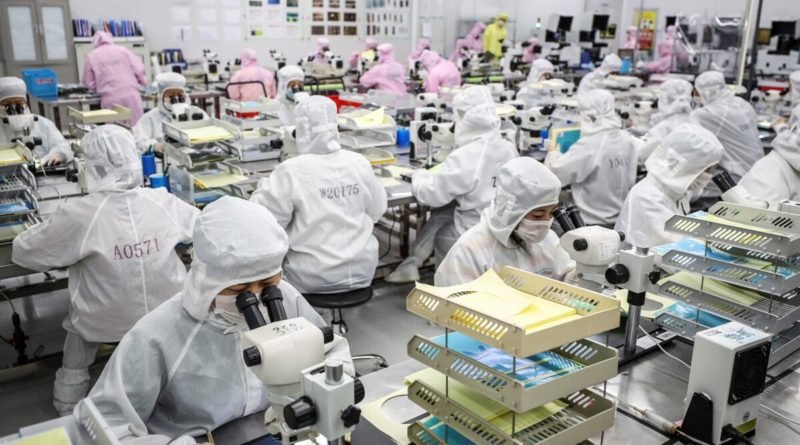China’s Metal Controls Fail
Commentary
In the latest break between China and the United States, Beijing imposed export controls on gallium and germanium. The two minerals, which Beijing plans to restrict starting Aug. 1, are critical to high-tech products like ultra-fast computer chips, electric vehicles, radar, night vision devices, missile defense, fiber optics, LEDs, and satellite imagery.
China produces approximately 60 percent of the world’s germanium and over 90 percent of gallium, giving the country leverage over end users.
The controls are widely seen as retaliation for U.S., Japanese, South Korean, and Dutch restrictions on chips and the complex equipment necessary to manufacture them. They could also protect dwindling resources in China, according to experts cited by Hong Kong media.
Some other metals, like indium, will also be subject to the new controls, according to Reuters. Indium is reportedly less restricted.
The timing of the announcement, just days before U.S. Treasury Secretary Janet Yellen’s trip to China, will give Beijing a bargaining chip in its attempt to stop U.S. restrictions, including potentially on cloud computing.

In May, Beijing banned Micron Technology chips from its critical infrastructure, including information infrastructure used by large banks and telecom companies.
But, if Beijing did think its new controls would be effective bargaining chips, it should have known that Washington has other options. On July 6, the Pentagon announced that it has strategic reserves of germanium (though not of gallium).
On July 5, a Commerce Department spokesperson said Beijing’s new controls “underscore the need to diversify supply chains. The United States will engage with our allies and partners to address this and to build resilience in critical supply chains.”
Taiwan’s deputy foreign minister said, “Export controls … are an accelerator, for countries including Taiwan, South Korea and Japan to reduce our dependence on China’s supply of those critical materials.”
South Korea, a leading chipmaker, said that even the short-term impact of China’s new controls would be limited.
China’s former vice commerce minister said the controls were “just a start,” however, and could broaden if the West continues pressuring China.
Germany’s economy minister said any broadening, for example to lithium used in batteries, would be “problematic.” Restrictions on Chinese graphite exports would hit global automakers particularly hard.
Alternative sources of gallium and germanium can be found in Alaska, Tennessee, and Washington states, and from recycling scrap.
The metals can also be acquired from Canada, Japan, South Korea, Australia, Germany, and Belgium.
One industry source said accelerated refining processes in these countries could take a couple years to fully replace current imports from China.
This would increase the price of computer chips in the short term but diversify supply chains in the long term.
Netherlands-based Nyrstar announced on July 4 that it would seek to produce gallium and germanium in the United States, Europe, and Australia.
Some argue that the gallium and germanium restrictions are inconsequential relative to graphite or lithium, and therefore meant as a shot across the bow. Nevertheless, they seem unwise from even Beijing’s perspective as they alert the United States and allies and incentivize preemptive de-linking of strategic supply chains from China. Xi Jinping’s advisors are likely telling him what he wants to hear, leading to a major strategic error.
The CCP’s restrictions on rare-earth elements (REE) against Japan in 2010 likewise backfired. Tokyo relatively easily found alternate sources, including through investment in an Australian REE producer and identification of undersea mining sites within Japanese territorial waters. The bans harmed China’s reputation as a reliable supplier.
Today, China accounts for approximately 70 percent of global REE mine production and 85 percent of its refinement processing. China’s dominance of the sector, which produces extensive toxic waste, is in part due to lax environmental laws.
The United States, Australia, Thailand, and Myanmar also mine or refine REE, though to a much lesser extent. Vietnam, Russia, Brazil, and India have extensive REE reserves. Russia and the Democratic Republic of Congo both said they could increase supply of the metal.
U.S. dependence on China for REE imports has decreased from approximately 80 percent between 2014 to 2017, to about 74 percent today. The restrictions on gallium and germanium will accelerate this trend across all critical supply chains.
Beijing’s ham-fisted attempt at leveraging its metals industry against the United States and allies is only further isolating the country economically and technologically.
Views expressed in this article are the opinions of the author and do not necessarily reflect the views of The Epoch Times.




